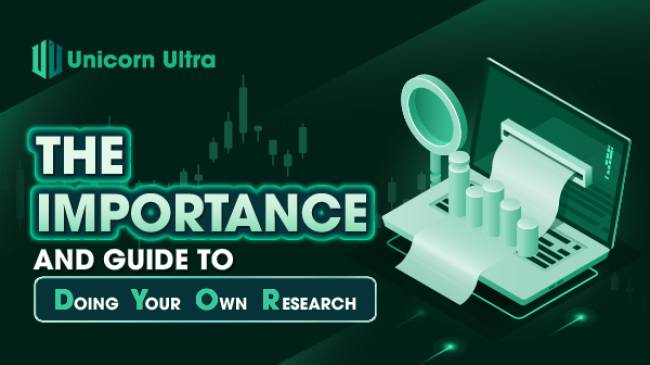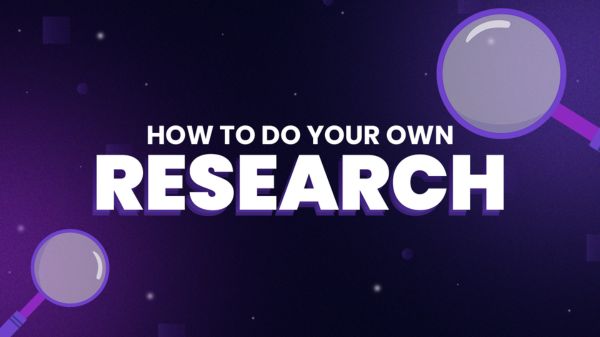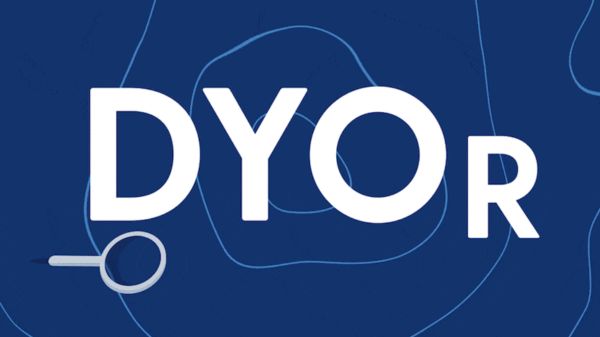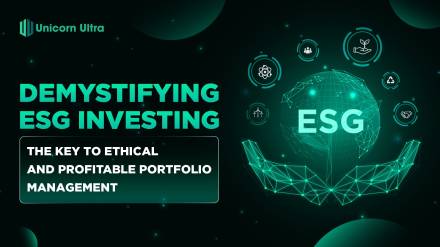In the fast-paced and information-rich era we live in, conducting thorough research before making any decisions is vital. Whether you're considering an investment opportunity, buying a new product, or exploring a new topic, relying solely on others' opinions or information can lead to unfavorable outcomes. This is where DYOR comes into play. Understand what is DYOR, its importance, and provide a comprehensive guide on how to effectively conduct your own research.
Table of Contents
What is DYOR?
What is DYOR? DYOR, short for "Do Your Own Research," is an acronym commonly used in the world of investing and decision-making. It emphasizes the importance of individuals conducting their own research, analysis, and due diligence before making any significant financial or life decisions. Rather than relying solely on others' recommendations or opinions, DYOR encourages individuals to take responsibility for gathering relevant information and forming their own informed conclusions.

Why is it important to do your own research?
Avoiding scams and misinformation: By conducting your own research, you reduce the risk of falling victim to scams or misinformation. The internet is teeming with false information, and blindly trusting unverified sources can have dire consequences. DYOR empowers you to separate fact from fiction, enabling you to make informed decisions.
Making informed investment decisions: When it comes to investing, DYOR is paramount. Relying solely on tips or recommendations without conducting your own analysis can lead to significant financial losses. By delving into the fundamental and technical aspects of an investment opportunity, you gain a deeper understanding and can make more informed investment choices.
Building confidence in decision-making: Doing your own research builds confidence in your decision-making abilities. When you have personally examined the available information, you are more likely to trust your judgment, allowing you to make decisions that align with your goals and values.
How To Do Your Own Research (DYOR)?
- Identify your objective: Clearly define the purpose of your research. Are you looking to make an investment, buy a product, or gain knowledge about a specific topic? Identifying your objective will help you focus your research efforts.
- Gather information from reliable sources: Look for information from reputable sources such as academic journals, established news outlets, industry reports, and reliable websites. Avoid relying solely on social media or anonymous forums, as the information there may be biased or inaccurate.
- Verify the credibility of sources: It's essential to evaluate the credibility of the sources you use. Consider the author's qualifications, the publication's reputation, and whether the information is supported by other reliable sources. Cross-referencing information from multiple sources can help you validate its accuracy.
- Analyze and synthesize information: Once you have gathered relevant information, critically analyze and synthesize it. Look for patterns, inconsistencies, or any missing pieces of the puzzle. This step involves examining different perspectives, considering both pros and cons, and forming your own conclusions based on the evidence.
- Consult experts or seek advice: If you are researching a complex subject, it can be beneficial to consult experts or seek advice from professionals in the field. Their insights and expertise can provide valuable context and enhance your understanding of the topic.
- Consider the risks and rewards: Assess the risks and rewards associated with your decision. Understand the potential downsides and evaluate whether the potential benefits outweigh them. This step is particularly crucial in investment research, where risk management plays a vital role.
- Document and track your research: Keep a record of your research findings, sources, and notes. This documentation will not only serve as a reference for future decisions but also help you track your progress in conducting thorough research over time.

What sources of information can be trusted to DYOR?
When conducting your own research (DYOR) in the cryptocurrency and blockchain space, it's essential to rely on reputable and trustworthy sources to gather accurate and reliable information. Here are some sources you can trust while doing your research:
- Official Project Websites: Start with the official websites of the blockchain projects or cryptocurrencies you are interested in. These websites typically provide essential information about the project's team, technology, use cases, roadmap, and whitepaper.
- Whitepapers: Read the project's whitepaper to understand its technical details, objectives, and vision. A well-written and comprehensive whitepaper is an essential source of information about a cryptocurrency or blockchain project.
- Developer Forums and Documentation: Check out developer forums and official documentation of blockchain projects. These resources often provide insights into the project's technical aspects and community discussions.
- Social Media and Community Channels: Engage with the project's official social media channels, like Twitter, Telegram, Discord, or Reddit. Observe discussions, announcements, and interactions to get a sense of the community's sentiment and project updates.
- Independent Research Platforms: Platforms like CoinMarketCap, CoinGecko, and CryptoCompare provide valuable data, metrics, and market analysis for various cryptocurrencies.
- Crypto News Websites: Stay informed through reputable cryptocurrency news websites and blogs. Examples include CoinDesk, Cointelegraph, and Decrypt. Be cautious of clickbait and sensationalist headlines.
- Academic Research Papers: Academic papers related to blockchain and cryptocurrencies can offer valuable insights, especially for more technical aspects of a project.
- Blockchain Auditing Firms: Look for audits conducted by reputable firms like CertiK, OpenZeppelin, or Trail of Bits. Audits assess the security and smart contract vulnerabilities of blockchain projects.
- Crypto Influencers and Analysts: Follow industry experts, analysts, and influencers who provide well-researched insights and analysis. However, always cross-check their information with other reliable sources.
- Blockchain Conferences and Webinars: Attend blockchain conferences, webinars, and workshops to hear from industry experts and project representatives. These events often offer valuable insights and networking opportunities.
- Community Feedback and Reviews: Gather feedback from the cryptocurrency community and read reviews on forums and platforms like Reddit or Trustpilot. However, be aware that not all opinions may be objective or accurate.
Remember to cross-check information from multiple sources to avoid potential biases or inaccuracies. Be wary of projects with insufficient information, unrealistic promises, or hidden agendas. DYOR is crucial for making well-informed investment and decision-making in the dynamic and rapidly evolving cryptocurrency market.

What are the risks of not doing your own research (DYOR)?
The risks of not doing your own research (DYOR) in the cryptocurrency and blockchain space are significant and can lead to various negative outcomes. Some of the key risks include:
- Investment Losses: Without conducting proper research, you may invest in cryptocurrencies or blockchain projects that have little potential or are outright scams. This could lead to significant financial losses.
- Scams and Frauds: Failing to research a project's legitimacy may result in falling victim to scams and fraudulent schemes, where malicious actors exploit unsuspecting investors.
- Lack of Understanding: Without conducting research, you may not fully understand the technology, use case, or risks associated with a particular cryptocurrency or blockchain project.
- Missed Opportunities: Not researching promising projects could lead to missed opportunities for investing in innovative and potentially profitable ventures.
- Security Risks: Investing in unknown or unverified projects may expose you to security risks, such as hacks or vulnerabilities in smart contracts.
- Unrealistic Expectations: Lack of research can lead to unrealistic expectations about potential returns on investments, causing disappointment and frustration.
- Regulatory Compliance Issues: Failing to research the legal and regulatory aspects of a project may result in unintentional non-compliance with local laws or regulations.
- Market Manipulation: Without understanding the market dynamics, you may fall prey to market manipulation and pump-and-dump schemes.
- Inaccurate Information: Relying on unreliable sources or hearsay may lead to basing investment decisions on inaccurate or outdated information.
- Lack of Due Diligence: Neglecting research may result in overlooking critical factors like the project's team, partnerships, and competitive landscape.
- Emotional Decision-Making: Without solid research, emotions may drive investment decisions, leading to impulsive actions that can be detrimental in the volatile crypto market.
- Negative Reputation: Investing in poorly researched projects or promoting scams can harm your reputation within the cryptocurrency community.
To mitigate these risks, always conduct thorough research before investing in any cryptocurrency or blockchain project. Examine the project's whitepaper, team, technology, use case, community engagement, and market sentiment. Seek advice from trusted sources and consider joining communities to gain insights and share knowledge. DYOR is an essential practice for making informed decisions and navigating the complex and ever-changing landscape of cryptocurrencies.
Conclusion
DYOR, or Do Your Own Research, is a fundamental principle that applies to various aspects of life, including investing, decision-making, and personal growth. By taking responsibility for gathering information, analyzing it critically, and forming your own conclusions, you empower yourself to make informed choices that align with your goals and values. In an era overflowing with information, developing strong research skills is essential for navigating the complexities of our world. So, knowing what is DYOR, embrace the principle of DYOR and embark on a journey of knowledge, understanding, and well-informed decision-making. Follow Uniultra to be able to update more useful information and knowledge about cryptocurrency investment.






